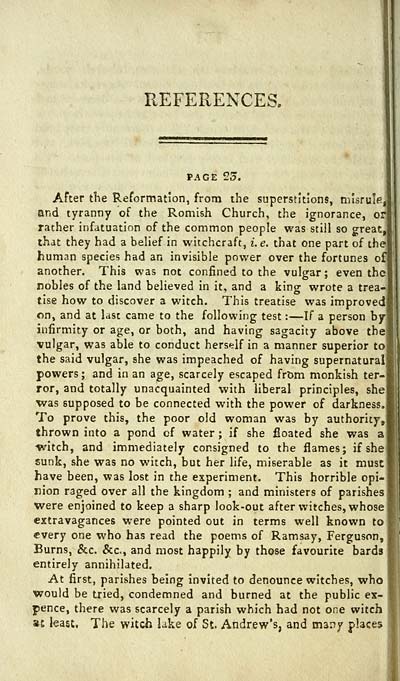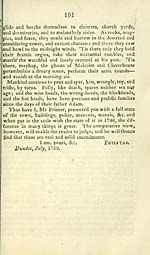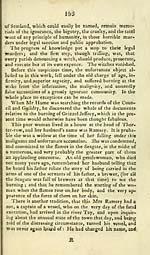Towns > Dundee > 1822 - Dundee delineated; or, A history and description of that town, its institutions, manufactures and commerce
(202)
Download files
Complete book:
Individual page:
Thumbnail gallery: Grid view | List view

REFERENCES.
PAGE 25.
After the Reformation, from the superstitions, tmsraleJ
and tyranny of the Romish Church, the ignorance, or
rather infatuation of the common people was still so great,
that they had a belief in witchcraft, i.e. that one part of the
human species had an invisible power over the fortunes of
another. This was not confined to the vulgar; even the
nobles of the land believed in it, and a king wrote a trea-
tise how to discover a witch. This treatise was improved
en, and at last came to the following test : — If a person by
infirmity or age, or both, and having sagacity above the
vulgar, was able to conduct herself in a manner superior to
the said vulgar, she was impeached of having supernatural
powers; and in an age, scarcely escaped from monkish ter-
ror, and totally unacquainted with liberal principles, she
was supposed to be connected with the power of darkness,
To prove this, the poor old woman was by authority,
thrown into a pond of water; if she floated she was a
•witch, and immediately consigned to the flames; if she I
sunk, she was no witch, but her life, miserable as it must!
have been, was lost in the experiment. This horrible opi-l
rrion raged over all the kingdom ; and ministers of parishes!
were enjoined to keep a sharp look-out after witches, whose I
extravagances were pointed out in terms well known to 1
every one who has read the poems of Ramsay, Ferguson, I
Burns, &c. &c, and most happily by those favourite bards f
entirely annihilated.
At first, parishes being invited to denounce witches, who I
would be tried, condemned and burned at the public ex- I
pence, there was scarcely a parish which had not one witch $
86 least. The witch hke of St. Andrew's, and many places I
PAGE 25.
After the Reformation, from the superstitions, tmsraleJ
and tyranny of the Romish Church, the ignorance, or
rather infatuation of the common people was still so great,
that they had a belief in witchcraft, i.e. that one part of the
human species had an invisible power over the fortunes of
another. This was not confined to the vulgar; even the
nobles of the land believed in it, and a king wrote a trea-
tise how to discover a witch. This treatise was improved
en, and at last came to the following test : — If a person by
infirmity or age, or both, and having sagacity above the
vulgar, was able to conduct herself in a manner superior to
the said vulgar, she was impeached of having supernatural
powers; and in an age, scarcely escaped from monkish ter-
ror, and totally unacquainted with liberal principles, she
was supposed to be connected with the power of darkness,
To prove this, the poor old woman was by authority,
thrown into a pond of water; if she floated she was a
•witch, and immediately consigned to the flames; if she I
sunk, she was no witch, but her life, miserable as it must!
have been, was lost in the experiment. This horrible opi-l
rrion raged over all the kingdom ; and ministers of parishes!
were enjoined to keep a sharp look-out after witches, whose I
extravagances were pointed out in terms well known to 1
every one who has read the poems of Ramsay, Ferguson, I
Burns, &c. &c, and most happily by those favourite bards f
entirely annihilated.
At first, parishes being invited to denounce witches, who I
would be tried, condemned and burned at the public ex- I
pence, there was scarcely a parish which had not one witch $
86 least. The witch hke of St. Andrew's, and many places I
Set display mode to: Large image | Transcription
Images and transcriptions on this page, including medium image downloads, may be used under the Creative Commons Attribution 4.0 International Licence unless otherwise stated. ![]()
| Scottish Post Office Directories > Towns > Dundee > Dundee delineated; or, A history and description of that town, its institutions, manufactures and commerce > (202) |
|---|
| Permanent URL | https://digital.nls.uk/85826455 |
|---|
| Description | Directories of individual Scottish towns and their suburbs. |
|---|
| Description | Around 700 Scottish directories published annually by the Post Office or private publishers between 1773 and 1911. Most of Scotland covered, with a focus on Edinburgh, Glasgow, Dundee and Aberdeen. Most volumes include a general directory (A-Z by surname), street directory (A-Z by street) and trade directory (A-Z by trade). |
|---|


